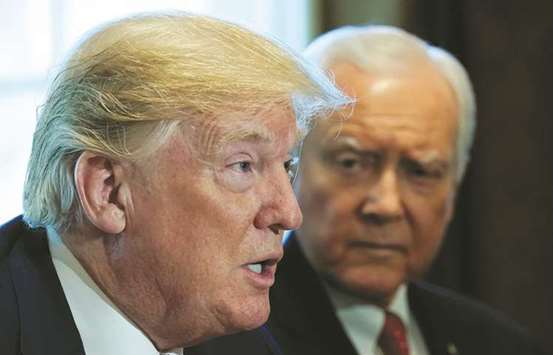A bipartisan deal from two US senators to stabilise Obamacare by restoring subsidies to health insurers ran into trouble yesterday with President Donald Trump sending mixed signals and the speaker of the House indicating no interest in taking it up.
The deal announced on Tuesday by Republican Lamar Alexander and Democrat Patty Murray was intended to shore up Obamacare by reviving billions of dollars of subsidies to insurers for two years to help lower-income Americans obtain medical coverage.
The administration followed through on Trump’s plan from last week to end the subsidies, withholding a payment of hundreds of millions of dollars to insurers that had been scheduled for yesterday.
Alexander said yesterday Trump had “completely engineered” the bipartisan proposal but the president seemed to back away from support he had expressed a day earlier.
“Lamar Alexander’s working on it very hard from our side. And if something can happen, that’s fine,” Trump told reporters at the White House. “But I won’t do anything to enrich the insurance companies.... They’ve been enriched by Obamacare like nothing anybody’s ever seen before.”
Insurers say they do not profit from the subsidies but pass them on directly to consumers to reduce the deductibles, co-payments and other out-of-pocket medical expenses for low-income Americans.
Ending the subsidies, which are called cost-sharing reduction payments, could create chaos in the 2018 health insurance markets set up under Obamacare.
In a Twitter post yesterday, Trump wrote, “I am supportive of Lamar as a person & also of the process, but I can never support bailing out ins co’s who have made a fortune w/ O’Care.”
But the president during a news conference on Tuesday said the White House had been involved in negotiations on the Alexander-Murray deal and that it would be “a very good solution” in the short-term to “get us over this intermediate hump”.
Trump, who campaigned on a promise to get rid of Obamacare but has been frustrated by the failure of Republicans in Congress to pass legislation to do so, also made clear on Tuesday that he eventually wanted broader legislation to repeal and replace the law.
Republican House of Representatives Speaker Paul Ryan gave no indication of willingness to consider the Alexander-Murray agreement.
“The speaker does not see anything that changes his view that the Senate should keep its focus on repeal and replace of Obamacare,” Ryan spokesman Doug Andres said. While the proposal drew broad Democratic support, it remained unclear whether it will even come to a vote in the Senate and House, both controlled by Trump’s fellow Republicans.
Republicans have a 52-48 Senate majority but other than Alexander, Susan Collins and John McCain are the only Republican senators who have publicly embraced the plan.Top Senate Democrat Chuck Schumer ripped Trump for his shifting stance on the Alexander-Murray deal.
“This president cannot govern if, whenever the hard right frightens him and says ‘jump,’ he says, ‘How high?’” Schumer told reporters.
“The president is pointing fingers,” Schumer said. “He blames (Senate Majority Leader) Mitch McConnell for obstruction. He blames the Democrats for obstruction. He’s the obstructionist-in-chief because he cannot stick to a position.”
The Alexander-Murray proposal would meet some Democratic objectives, such as reviving subsidies for Obamacare and restoring $106mn in funding for a federal programme that helps people enrol in insurance plans.
In exchange, Republicans would get more flexibility for states to offer a wider variety of health insurance plans while maintaining the requirement that sick and healthy people be charged the same rates for coverage.
Murray, speaking to Reuters yesterday, said her agreement with Alexander was still very much alive.
“Absolutely,” Collins said. “Lamar and I are working to have a good set of co-sponsors,” and hope to formally introduce it as a Senate bill today. She would not comment on whether Republicans other than McCain and Collins have joined in. “Lamar is building his Republican co-sponsors. He’s working it,” Murray said.
At an event sponsored by the news website Axios, Alexander said, “Trump completely engineered the plan that we announced yesterday. “He wanted a bipartisan bill for the short term.”
The president’s move last week to discontinue subsidies was part of his effort to dismantle the 2010 Affordable Care Act, known as Obamacare, through executive actions because his fellow Republicans who control Congress have failed to pass legislation to repeal and replace the law.
Trump said on Tuesday he wanted lawmakers, once they have completed work on his tax-cut proposal, to again take up broader legislation that failed in the Senate last month that would divvy up federal healthcare money as block grants to states.

Senate Finance Committee Chairman Orrin Hatch and President Donald Trump at the White House in Washington.
